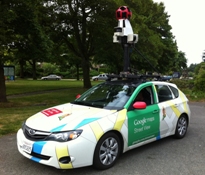Six Words in August
 Google’s been catching a lot of privacy flak recently. Just this week, various news organizations picked up the story that Google had filed a brief back in June arguing that sending emails to someone else waives any reasonable expectation of privacy as to the content of those emails. I think the furor that has erupted is somewhat overblown, but that’s not what I want to focus on right now.
Google’s been catching a lot of privacy flak recently. Just this week, various news organizations picked up the story that Google had filed a brief back in June arguing that sending emails to someone else waives any reasonable expectation of privacy as to the content of those emails. I think the furor that has erupted is somewhat overblown, but that’s not what I want to focus on right now.
Rather, I want to focus on a different Google privacy argument from June. My post last week mentioned Google’s argument to the Ninth Circuit that the Wiretap Act does not protect unencrypted wi-fi signals. This argument has a lot of practical significance. Although the number is dwindling, many people still have unencrypted home wireless networks. Wi-fi hotspots, such as those found in coffee shops and airports, are often unencrypted. And many devices emit all sorts of unencrypted information on a regular basis, which an unscrupulous individual or company could use to track people. If Google is correct, all of that tracking and snooping would be be legally in the clear, at least as far as the Wiretap Act is concerned. The oral argument was two months ago, so a decision could come down at any time.
I began this post as a quick explanation of why I think Google’s argument is mistaken. I’d read the relevant statutory language probably a dozen times or more, and I thought Google’s interpretation was simply wrong. But the Wiretap Act is so convoluted that it is dangerous to draw conclusions without thoroughly mapping out a path through all the definitions and exceptions and exceptions to definitions. After having done that for this post, I don’t think Google’s argument is quite so wrong-headed anymore. But (insert dramatic twist musical cue here) I now believe it should ultimately fail anyway, for a reason I haven’t seen anyone mention–either because it’s eluded everyone else, or because it is so obviously wrong no one has bothered. Caveat emptor.
Much like the Wiretap Act itself, this post is going to be long and detailed, so I’ve broken it up into four (!) parts. In this part, I’ll explain the Ninth Circuit litigation and the basic arguments of the parties. In Part II, I’ll explain why I think Google’s arguments are stronger than an initial read might suggest. In Part III, I’ll make a foray into the legislative history to try to figure out how the Wiretap Act got the way it is. Finally in Part IV, I’ll explore whether Google should still lose based on a close look at how wi-fi actually works. Read More »Six Words in August